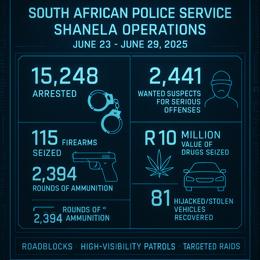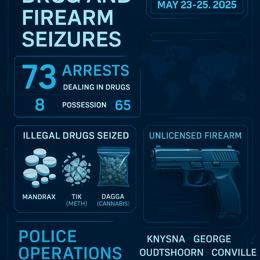Image created by AI
National Police Oversight: Call for Suspension of Arrested SAPS Officers Amid Corruption Charges
In a move resonating through South Africa’s law enforcement corridors, Ian Cameron, the chairperson of the parliamentary portfolio committee on police, has taken a stern stance by insisting on the suspension of all South African Police Service (SAPS) members recently arrested. This comes in light of the arrest of Dumisani Khumalo, head of the Crime Intelligence division, and several key figures, escalating concerns over corruption within the ranks.
The arrests, involving senior officers such as Crime Intelligence CFO Philani Lushaba and heads of important police departments, are the result of an extensive investigation into what has been described as the unlawful acquisition of high-value properties. The case reflects what Cameron called a "level of rot" that not only jeopardizes the functional integrity of SAPS but also deepens public mistrust toward the police.
Cameron emphasized the critical impact of these developments on national security, particularly highlighting the Crime Intelligence unit’s pivotal role in combating crime. He suggested that the affair necessitates not only suspensions but a comprehensive skills audit of senior SAPS officials, along with periodic lifestyle audits, especially within sensitive units.
Amid these charges, the broader question of law enforcement credibility and ethics has come sharply into focus. Cameron criticized SAPS management’s previously lax approach to handling officers with criminal allegations and underscored the necessity for a swift and thorough investigation to ensure that only qualified and ethical individuals serve in the police.
This incident has further stirred the police governance pot, as reports surfaced over the weekend about potential legal action against National Police Commissioner Fannie Masemola. However, these were promptly refuted by the National Prosecuting Authority’s Investigating Directorate Against Corruption, which denied seeking an arrest warrant for Masemola related to irregular procurement activities.
The unfolding scenario stresses the urgency for SAPS to revamp its internal accountability mechanisms. The portfolio committee on police is set to schedule a meeting to deliberate the ramifications of these arrests and to establish robust internal consequence management processes.
In conclusion, these events mark a critical juncture for SAPS in its efforts to cleanse itself of corruption and restore public confidence. The insistence on rigorous internal scrutiny and the suspension of accused officers underlines a decisive shift toward transparency and accountability in South African policing.










